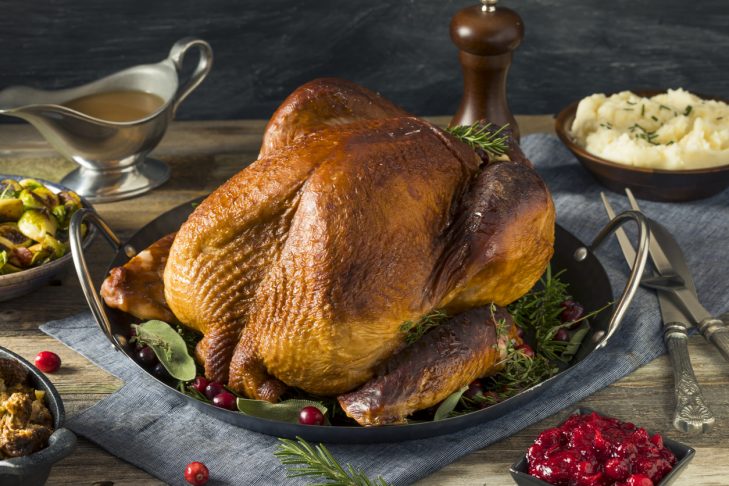“Ain’t gonna be no pie till we first talk about how we’re gonna die”
—Anonymous (though I wish it were mine)
Here is a big, bold and brave challenge I offer you this Thanksgiving. Have a conversation around the table with those whom you love about how you want to die!
I can hear you now. “What the what did he just say? Talk about my death, of all places, at the Thanksgiving table?”
Yes, that’s exactly what I said and here is why.
If you love those people around the table, then do more than just tell them—show them. Because, my friends, there ain’t nothing more loving than having this difficult conversation, and there isn’t anything more painful, even cruel, than waiting till it’s too late.
If you love your family. If you want the best for your loved ones. If you want to care for them in life, and in death, then read on.
Having practiced as a synagogue rabbi for 15 years, I sat with dozens of families who would have given anything to go back in time to one of those magical and memorable Thanksgiving dinners. They only wished their family would have disrupted the football game or delayed the pumpkin pie so they could have had the hard conversations about what their loved one wanted at the end of their life. However, often by the time I sat with them in the ER, their loved one was no longer able to communicate as they were on life support. They may have technically still been alive, but technically alive, in so many ways, is even more painful than being dead.
Death is tragic, however, and these moments, when the family is asked to make life and death decisions for a loved one, are tragedy compounded. Add to it a situation where the person doesn’t have clear medical directives, and it is tragedy beyond belief. And this happens all the time.
Families do not communicate amongst themselves end-of-life wishes. Spouses do not talk about what they want if they are ever unable to decide for themselves. Parents do not convey to their children who their health care proxy will be. And even when the thoughts are conveyed, it isn’t written down, formal paperwork is ignored or legal documents are neglected. “We’ll deal with it later, someday, any day, just not today,” the vast majority of us say, through our words and our deeds (or lack thereof).
Time and again I have had this conversation with the most loving, caring, responsible adults:
- “Rabbi, I don’t need to bring this up with my children. They know what I want,” an 80-year-old mother will say.
- “With all due respect, my wife knows what I would expect,” a 72-year-old husband responds.
- “I’m certain grandpa has taken care of his end-of-life wishes, communicated how he wants to die, and made the necessary preparations for his burial,” so, so, so many falsely assume.
- “Therefore, why in the heck would you want me to ruin a perfectly happy Thanksgiving celebration by talking about what happens when we die?” I can hear many of you asking me right now.
The truth, however, is that far too often that’s not how it plays out at the end of life. That’s not what happens to families when their loved one is in a coma and it’s time to turn off life support, stop the feeding or make some other horrific decision that will terminate life or prolong it indefinitely at a quality which our loved one would have never agreed.
Did dad want to be resuscitated? The daughter says, “Absolutely,” the son says, “No way.”
“Do you think mom would have wanted to be kept alive with a respirator?” Her children think she wouldn’t have wanted this, but her husband can’t bear to have to make that decision on her behalf.
Families become divided. Doubt, guilt and panic descends. Grown children crumble, spouses fall apart and so much unnecessary extra suffering sets in. All because medical directives were not filled out, legal wills were not filed, funeral arrangements were not made. Yes, these are difficult and painful conversations. However, they are infinitely more painful when that dreaded day comes and a family is left guessing, wondering and speculating as to what to do. These questions could have been answered, should have been answered, were meant to be answered, but they were not—because no one wanted to disrupt the game, spoil the turkey or ruin the pie.
My friends, these conversations, contrary to what we might think, are the most loving conversations we can have. If we love our family, want the best for our family and want to give them everything we possibly can, then we owe it to them to give them the gift of deciding these issues for ourselves and communicating our wishes to them. To not decide a decision unto itself. Yes, we may have avoided some really heavy baggage, for now. But there will come a day when someone, namely our family, will have to pick those bags up and carry them for us—at a time when they are devastated, heartbroken and weak (and those bags only get heavier and heavier the longer we pretend they aren’t there). No one intends on sticking their loved ones with this horrible baggage, but that is what happens nonetheless.
But, if you are reading this, then you are not in that situation, yet.
You still have time, for now.
The universe is presenting you with a tremendous gift—the gift of a Thanksgiving table and all of your loved ones around it, at least this one last time. Use it or lose it and be prepared to live, or die, with the consequences.
My friends, in the end, this isn’t a dialogue about death. It is a conversation about life. It’s an opportunity to talk about what matters to you to the people who matter most to you. It’s a chance to share with your loved ones what you want, not only for yourself, but for them within this life. It’s a rare and precious moment to teach your loved ones that death is a part of life. And it is a powerful opportunity to demonstrate to your loved ones that if you love someone, you don’t hide from the hard conversations. You don’t abandon each other, each to find their way alone through the darkness. You don’t delay the inevitable, passing the buck down the line for your loved ones to have to pay the debt. Rather, you are here to take one another by the hand, look at each other straight in the eye and not only say, “I love you,” but demonstrate how much you love each other, giving the gift of talking about how you want to die.
That is what it means to live.
That is what it means to love.
That is what Thanksgiving is all about.
So, remember, if you haven’t had this conversation with your family, just recite these words sometime during the meal: “My beloved family, I have something to say. Tonight there will be no pie, until I talk about how I want to die.”
Have a wonderful, blessed and joyous Thanksgiving.
This post has been contributed by a third party. The opinions, facts and any media content are presented solely by the author, and JewishBoston assumes no responsibility for them. Want to add your voice to the conversation? Publish your own post here. MORE



